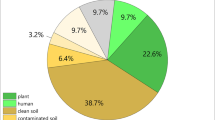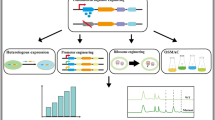Abstract
Certain point mutations within gene for ribosomal protein S12, rpsL, are known to dramatically change physiological traits of bacteria, most prominently antibiotic resistance and production of various metabolites. The rpsL mutants are usually searched among spontaneous mutants resistant to aminoglycoside antibiotics, such as streptomycin or paromomycin. The shortcomings of traditional selection are as follows: random rpsL mutants may carry undesired genome alterations; many rpsL mutations cannot be isolated because they are either not associated with increased antibiotic resistance or non-viable in the absence of intact rpsLWT gene. Introduction of mutant rpsL alleles in the rpsLWT background can be used to circumvent these obstacles. Here we take the latter approach and report the generation and properties of a set of stable rpsL merodiploids for Streptomyces albus J1074. We identified several rpsL alleles that enhance endogenous and heterologous antibiotic production by this strain and show that rpsLWTrpsLK88E merodiploid displays increased streptomycin resistance. We further tested several promising rpsL alleles in two more strains, Streptomyces cyanogenus S136 and Streptomyces ghanaensis ATCC14672. In S136, plasmid-borne rpsLK88E+P91S and rpsLK88R led to elevated landomycin production; no changes were detected for ATCC14672 merodiploids. Our data outline the prospects for and limitations to rpsL merodiploids as a tool for rapid enhancement of secondary metabolism in Streptomyces.




Similar content being viewed by others
References
Adrio JL, Demain AL (2006) Genetic improvement of processes yielding microbial products. FEMS Microbiol Rev 30:187–214. https://doi.org/10.1111/j.1574-6976.2005.00009.x
Agarwal D, Gregory ST, O’Connor M (2011) Error-prone and error-restrictive mutations affecting ribosomal protein S12. J Mol Biol 410:1–9. https://doi.org/10.1016/j.jmb.2011.04.068
Ahmed Y, Rebets Y, Tokovenko B, Brötz E, Luzhetskyy A (2017) Identification of butenolide regulatory system controlling secondary metabolism in Streptomyces albus J1074. Sci Rep 7:9784. https://doi.org/10.1038/s41598-017-10316-y
Barka EA, Vatsa P, Sanchez L, Gaveau-Vaillant N, Jacquard C, Klenk H-P, Clément C, Ouhdouch Y, van Wezel GP, van Wezel GP (2016) Taxonomy, physiology, and natural products of Actinobacteria. Microbiol Mol Biol Rev 80:1–43. https://doi.org/10.1128/MMBR.00019-15
Bilyk B, Luzhetskyy A (2014) Unusual site-specific DNA integration into the highly active pseudo-attB of the Streptomyces albus J1074 genome. Appl Microbiol Biotechnol 98:5095–5104. https://doi.org/10.1007/s00253-014-5605-y
Genuth NR, Barna M (2018) The discovery of ribosome heterogeneity and its implications for gene regulation and organismal life. Mol Cell 71:364–374. https://doi.org/10.1016/j.molcel.2018.07.018
González A, Rodríguez M, Braña AF, Méndez C, Salas JA, Olano C (2016) New insights into paulomycin biosynthesis pathway in Streptomyces albus J1074 and generation of novel derivatives by combinatorial biosynthesis. Microb Cell Fact 15:56. https://doi.org/10.1186/s12934-016-0452-4
Gregory MA, Till R, Smith MCM (2003) Integration site for Streptomyces phage phiBT1 and development of site-specific integrating vectors. J Bacteriol 185:5320–5323. https://doi.org/10.1128/jb.185.17.5320-5323.2003
Gromyko O, Rebets Y, Ostash B, Luzhetskyy A, Fukuhara M, Bechthold A, Nakamura T, Fedorenko V (2004) Generation of Streptomyces globisporus SMY622 strain with increased landomycin E production and it’s initial characterization. J Antibiot (Tokyo) 57:383–389. https://doi.org/10.7164/antibiotics.57.383
Herrmann S, Siegl T, Luzhetska M, Petzke L, Jilg C, Welle E, Erb A, Leadlay PF, Bechthold A, Luzhetskyy A (2012) Site-specific recombination strategies for engineering actinomycete genomes. Appl Environ Microbiol 78:1804–1812. https://doi.org/10.1128/AEM.06054-11
Hosaka T, Tamehiro N, Chumpolkulwong N, Hori-Takemoto C, Shirouzu M, Yokoyama S, Ochi K (2004) The novel mutation K87E in ribosomal protein S12 enhances protein synthesis activity during the late growth phase in Escherichia coli. Mol Genet Genomics 271:317–324. https://doi.org/10.1007/s00438-004-0982-z
Hosaka T, Xu J, Ochi K (2006) Increased expression of ribosome recycling factor is responsible for the enhanced protein synthesis during the late growth phase in an antibiotic-overproducing Streptomyces coelicolor ribosomal rpsL mutant. Mol Microbiol 61:883–897. https://doi.org/10.1111/j.1365-2958.2006.05285.x
Hosaka T, Ohnishi-Kameyama M, Muramatsu H, Murakami K, Tsurumi Y, Kodani S, Yoshida M, Fujie A, Ochi K (2009) Antibacterial discovery in actinomycetes strains with mutations in RNA polymerase or ribosomal protein S12. Nat Biotechnol 27:462–464. https://doi.org/10.1038/nbt.1538
Hosted TJ, Baltz RH (1997) Use of rpsL for dominance selection and gene replacement in Streptomyces roseosporus. J Bacteriol 179:180–186. https://doi.org/10.1128/jb.179.1.180-186.1997
Huang H, Zheng G, Jiang W, Hu H, Lu Y (2015) One-step high-efficiency CRISPR/Cas9-mediated genome editing in Streptomyces. Acta Biochim Biophys Sin (Shanghai) 47:231–243. https://doi.org/10.1093/abbs/gmv007
Kallifidas D, Jiang G, Ding Y, Luesch H (2018) Rational engineering of Streptomyces albus J1074 for the overexpression of secondary metabolite gene clusters. Microb Cell Fact 17:25. https://doi.org/10.1186/s12934-018-0874-2
Kieser T, Bibb MJ, Buttner MJ, Chater KF, Hopwood DA (2000) Practical Streptomyces genetics. The John Innes Foundation, Norwich
Koshla O, Lopatniuk M, Rokytskyy I, Yushchuk O, Dacyuk Y, Fedorenko V, Luzhetskyy A, Ostash B (2017) Properties of Streptomyces albus J1074 mutant deficient in tRNALeuUAA gene bldA. Arch Microbiol 199:1175–1183. https://doi.org/10.1007/s00203-017-1389-7
Lilleorg S, Reier K, Pulk A, Liiv A, Tammsalu T, Peil L, Cate JD, Remme J (2018) Bacterial ribosome heterogeneity: changes in ribosomal protein composition during transition into stationary growth phase. Biochimie 156:169–180. https://doi.org/10.1016/j.biochi.2018.10.013
Lopatniuk M, Myronovskyi M, Nottebrock A, Busche T, Kalinowski J, Ostash B, Fedorenko V, Luzhetskyy A (2019) Effect of “ribosome engineering” on the transcription level and production of S. albus indigenous secondary metabolites. Appl Microbiol Biotechnol 103:7097–7110. https://doi.org/10.1007/s00253-019-10005-y
Luzhetskyy A, Mayer A, Hoffmann J, Pelzer S, Holzenkämper M, Schmitt B, Wohlert S-E, Vente A, Bechthold A (2007) Cloning and heterologous expression of the aranciamycin biosynthetic gene cluster revealed a new flexible glycosyltransferase. ChemBioChem 8:599–602. https://doi.org/10.1002/cbic.200600529
Makitrynskyy R, Rebets Y, Ostash B, Zaburannyi N, Rabyk M, Walker S, Fedorenko V (2010) Genetic factors that influence moenomycin production in Streptomycetes. J Ind Microbiol Biotechnol 37:559–566. https://doi.org/10.1007/s10295-010-0701-1
Makitrynskyy R, Ostash B, Tsypik O, Rebets Y, Doud E, Meredith T, Luzhetskyy A, Bechthold A, Walker S, Fedorenko V (2013) Pleiotropic regulatory genes bldA, adpA and absB are implicated in production of phosphoglycolipid antibiotic moenomycin. Open Biol 3:130121. https://doi.org/10.1098/rsob.130121
Myronovskyi M, Rosenkränzer B, Nadmid S, Pujic P, Normand P, Luzhetskyy A (2018) Generation of a cluster-free Streptomyces albus chassis strains for improved heterologous expression of secondary metabolite clusters. Metab Eng 49:316–324. https://doi.org/10.1016/j.ymben.2018.09.004
Ochi K (2007) From microbial differentiation to ribosome engineering. Biosci Biotechnol Biochem 71:1373–1386. https://doi.org/10.1271/bbb.70007
Okamoto-Hosoya Y, Hosaka T, Ochi K (2003a) An aberrant protein synthesis activity is linked with antibiotic overproduction in rpsL mutants of Streptomyces coelicolor A3(2). Microbiology 149:3299–3309. https://doi.org/10.1099/mic.0.26490-0
Okamoto-Hosoya Y, Okamoto S, Ochi K (2003b) Development of antibiotic-overproducing strains by site-directed mutagenesis of the rpsL gene in Streptomyces lividans. Appl Environ Microbiol 69:4256–4259. https://doi.org/10.1128/AEM.69.7.4256-4259.2003
Olano C, García I, González A, Rodriguez M, Rozas D, Rubio J, Sánchez-Hidalgo M, Braña AF, Méndez C, Salas JA (2014) Activation and identification of five clusters for secondary metabolites in Streptomyces albus J1074. Microb Biotechnol 7:242–256. https://doi.org/10.1111/1751-7915.12116
Ostash B, Saghatelian A, Walker S (2007) A streamlined metabolic pathway for the biosynthesis of moenomycin A. Chem Biol 14:257–267. https://doi.org/10.1016/j.chembiol.2007.01.008
Sambrook J, Russell DW (2001) Molecular cloning: a laboratory manual, 3rd edn. Cold Spring Harbor Laboratory Press, New-York
Talà A, Wang G, Zemanova M, Okamoto S, Ochi K, Alifano P (2009) Activation of dormant bacterial genes by Nonomuraea sp. strain ATCC 39727 mutant-type RNA polymerase. J Bacteriol 191:805–814. https://doi.org/10.1128/JB.01311-08
Tamehiro N, Hosaka T, Xu J, Hu H, Otake N, Ochi K (2003) Innovative approach for improvement of an antibiotic-overproducing industrial strain of Streptomyces albus. Appl Environ Microbiol 69:6412–6417
Tan G-Y, Deng K, Liu X, Tao H, Chang Y, Chen J, Chen K, Sheng Z, Deng Z, Liu T (2017) Heterologous biosynthesis of spinosad: an omics-guided large polyketide synthase gene cluster reconstitution in Streptomyces. ACS Synth Biol 6:995–1005. https://doi.org/10.1021/acssynbio.6b00330
Tanaka Y, Komatsu M, Okamoto S, Tokuyama S, Kaji A, Ikeda H, Ochi K (2009) Antibiotic overproduction by rpsL and rsmG mutants of various actinomycetes. Appl Environ Microbiol 75:4919–4922. https://doi.org/10.1128/AEM.00681-09
Westrich L, Domann S, Faust B, Bedford D, Hopwood DA, Bechthold A (1999) Cloning and characterization of a gene cluster from Streptomyces cyanogenus S136 probably involved in landomycin biosynthesis. FEMS Microbiol Lett 170:381–387. https://doi.org/10.1111/j.1574-6968.1999.tb13398.x
Yushchuk O, Ostash I, Vlasiuk I, Gren T, Luzhetskyy A, Kalinowski J, Fedorenko V, Ostash B (2018) Heterologous AdpA transcription factors enhance landomycin production in Streptomyces cyanogenus S136 under a broad range of growth conditions. Appl Microbiol Biotechnol 102:8419–8428. https://doi.org/10.1007/s00253-018-9249-1
Zaburannyi N, Rabyk M, Ostash B, Fedorenko V, Luzhetskyy A (2014) Insights into naturally minimised Streptomyces albus J1074 genome. BMC Genomics 15:97. https://doi.org/10.1186/1471-2164-15-97
Zhang Q, Ren J-W, Wang W, Zhai J, Yang J, Liu N, Huang Y, Chen Y, Pan G, Fan K (2020) A versatile transcription-translation in one approach for activation of cryptic biosynthetic gene clusters. ACS Chem Biol. https://doi.org/10.1021/acschembio.0c00581
Acknowledgements
We thank Prof. Margaret Smith for providing us with pMS82 vector. Anton Pavlenko is thanked for the generation of S. ghanaensis merodiploids.
Funding
This work was supported by grants F60/2+F60/52 from State Fund for Fundamental Research and Bg-80F from the Ministry of Education and Science of Ukraine (both to B.O.). V.F. acknowledges the above agency for Grant Bg-09F.
Author information
Authors and Affiliations
Corresponding author
Ethics declarations
Conflict of interest
The authors declare that they have no conflict of interest.
Informed consent
All authors agreed on the publication.
Additional information
Publisher's Note
Springer Nature remains neutral with regard to jurisdictional claims in published maps and institutional affiliations.
Supplementary Information
Below is the link to the electronic supplementary material.
Rights and permissions
About this article
Cite this article
Koshla, O., Lopatniuk, M., Borys, O. et al. Genetically engineered rpsL merodiploidy impacts secondary metabolism and antibiotic resistance in Streptomyces. World J Microbiol Biotechnol 37, 62 (2021). https://doi.org/10.1007/s11274-021-03030-5
Received:
Accepted:
Published:
DOI: https://doi.org/10.1007/s11274-021-03030-5




